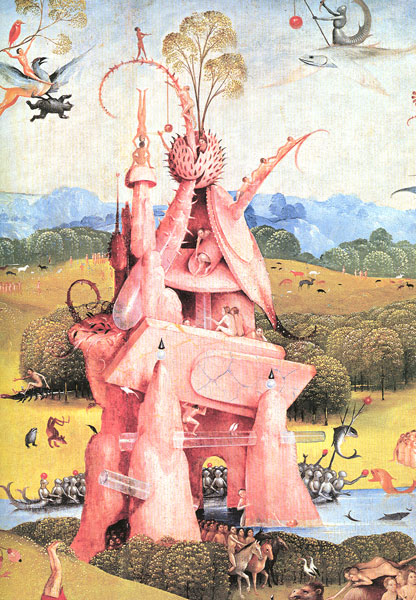I’m revising the first four chapters of Hylozoic these days, incorporarting all that new aktual stuff that I’ve been blogging about lately. Doing the rewrite feels like coming back to a canvas and adding another layer of painting. It helps the texture.

Last night we saw Dweezil Zappa leading the “Zappa Plays Zappa” band in Berkeley. It was a great show, the band tight and intricate. I still can’t believe Frank is dead. I always related to his mixture of spirituality and vulgarity. He rarely spoke of spiritual things, he let his guitar solos say all that better than words. A master.
Recently I’ve been writing some seriously heavy descriptions of visions or trippy transformation—like where Jayjay gets aktualized—and I was thinking that’s my kind of “guitar solo.”

I’ve been reading William Gibson’s new book Spook Country. The site has a little video of him talking about his book, which makes it more fun to read, as then his voice is fresh in your mind. The book is sheer pleasure: witty, full of great images, wonderful language, and fascinating insights.
I’m heartened to see that Bill has shares a number of my obsessions that I do, not that he and I ever end up writing about something in the same way. He takes more of a sociological and documentary view, and I’m more oriented towards philosophy and romance. I’m happy to see the overlaps, as it gives me a sense of solidarity with a writer I admire. Here’s links into my blog for my takes on some of these topics, along with Gibson quotes on the topics.

* Locative art and the global positioning grid. “ ‘See-bare-espace,’ Odile pronounced, gnomically, ‘it is everting.’ … ‘Turns itself inside out,’ offered Alberto, by way of clarification. ‘Cyberspace.’” p. 20. “‘And once it everts, then there isn’t any cyberspace, is there? There never was, if you want to look at it that way. It was a way we had of looking where we were headed, a direction. With the [GPS] grid, we’re here. This is the other side of the screen.’” p. 64.
* Cepahlopods. “Ten feet above the orange tape outline, the glossy, grayish-white form of a giant squid appeared, about ninety feet in total length, its tentacles undulating gracefully … The squid’s eerie surface flooded with light, subcutaneous pixels sliding past in distorted video imagery, stylized kanji, wide eyes of anime characters. It was gorgeous, ridiculous.” p. 55
* Ants. “Another cousin, relocated from New Orleans in the wake of the flood, had spoken of seeing a swarming, glittering ball of red ants in the water. This was how ants avoided drowning, it seemed…” p. 13. “Cultural Marxism was what other people called political correctness, according to Brown … and had come to the US from Germany … in the cunning skulls of a clutch of youngish professors from Frankfurt. The Frankfurt school, as they’d called themselves, had wasted no time in plunging their intellectual ovipostors repeatedly into the unsuspecting body of old-school American academia. Milgrim always enjoyed this part; it had an appealing vintage sci-fi campiness to it, staccato and exciting, with grainy monchrome Euorcommie star-spawn in tweek jackets and knit ties, breeding like Starbucks.” p. 126.
* Hieronymus Bosch. “He saw the IF [a guy they’re spying on], for whatever reason, as a bird-headed Bosch creature, pursued by Brown and Brown’s people, a brown-hooded posse astride heraldic beasts taht weren’t quite horses, their swirling banner inscribed with slogans in the IF’s Volapuk. Sometimes they journeyed for days into the stylized groves bordering that landscape, glimpsing strange creatures in wooded shadow.” p. 48.
* Tulpas. “…the celebrity self is a sort of tulpa … A projected thought-form. A term from Tibetan mysticism. The celebrity self has a life of its own. It can, under the right circumstances, indefinitely survive the death of the subject. That’s what every Elvis sighting is about, literally.” p. 102.
* Spectral beings that live in the woods. “But past Philadelphia, and after taking another tablet, Milgrim began to catch glimpses of spectral others, angels perhaps. The late-afernoon sun dressed the passing woods with Maxfield Parrish foxfire, and perhaps it was that epileptic flicker generated by teh train’s motion that called these beings forth. He found them neutral, if not actually benign. They belonged to this landscape, this hour and time of year, and not to his story.” p. 208.
* Continuous valued cellular automata. “‘It [a certain computer program] implements finite difference methods for the solution of partial differential equations, on block-structures, adaptively refined rectangular grids.’ Sarah made a brief and probably unconscious face.” p. 273.

On the whole, I found Spook Country humbling. The work is so polished. The dialog, the descriptions and the apercus. Good characterization. Hip.

You’re rooting for all the characters, they aren’t contemptible as my Hylozoic characters, Jayjay and Thuy, threaten to become. There’s a simple clear climax that the whole book builds towards. It’s not a gnarly four hundred pound yam.
Be that as it may, right now my only path is to finish writing Hylozoic to the end, get a rough version, and then go back and polish up the dialog, the descriptions and apercus, and the characterization. There’s no particular reason it actually needs to be like Spook Country. A writer can’t keep changing course. That way likes madness.
Gibson takes about four years to write a book. That’s a lot of polishing Maybe if I polished my book for a couple more years I could make it really shiny. Oh well. Maybe some other time I’ll polish a book for four years. I think I’ll do Hylozoic in about a year and a half, as usual.











August 22nd, 2007 at 9:50 am
I recently got the DVD “Zappa- Apostrophe (‘)/Overnite Sensation” from Amazon. There are several extras included. A few of them are Dweezil deconstructing his dad’s songs on a mixing board. Fascinating stuff. If you don’t already have it, highly recommended.
August 25th, 2007 at 2:50 am
Milgrim’s always high.
What I’d like to know is what happened to the 100 mil.
Maybe they hid it in Gibson’s loft and it irradiated his mind.
August 25th, 2007 at 8:10 am
I found Frank’s music to be very spiritual and soulful as well even though he was a devout atheist. If you really like his music then you’re welcome to try out a new online music station that I’ve created with software out of Hungary. It’s called “The Acid Jazz Channel” and features anywhere from 10 to 15 of Frank’s vids. I tend to like his instrumental stuff more in that I’m a jazz fan…Real music, real musicians is the motto.
You’re welcome to check out the station here:
http://www.threeriversonline.com/philsmusicshow.htm
Philip Shropshire
http://www.threeriversonline.com
August 27th, 2007 at 7:05 am
Dave Itzkoff reviews SPOOK COUNTRY in this week’s NY Times Book Review. Pretty good review, though he could say more about G’s style.
I was thinking that if SPOOK COUNTRY had been written 10 years ago, it would be SF, but now it’s not. Not every realistic book about the present WOULD have seemed like SF if published 10 or 20 years ago, so my comment is not without content. Ther’s something like an SF worldview, which carries over into mimetic realism. It’s the kinds of things you focus on, and what you think is interesting or funny.
One slip-up by the Itz: he sez Milgrim is an ampehetamine addict, but he’s in fact addicted to a certain family of tranquilizer/anti-anxiety drug, the benzos . This includes (as well as Rize) Xanax, Ativan, Valium, Klonopin, Halcion, etc. Trust Gibson to have a character with an addiction that hardly anyone’s heard of.
An early trank was called Miltown. Maybe Milgrim = Miltown Pilgrim.
August 27th, 2007 at 12:41 pm
SPOOK COUNTRY reminded me of Jack Womack’s awesome and hilarious and undeservedly overlookd LET’S PUT THE FUTURE BEHIND US. Readers of the latter (and if you’re not one, I highly recommend it) will recognize the similarity of certain key elements around which the plots of both books revolve.
August 27th, 2007 at 2:30 pm
I agree with MarcL. Most of Womack’s books are brilliant.
But Spook Country reminded me more of one of his not so good books, the aptly titled Going, Going Gone. It also reminded me of Paul McAuley’s Whole Wide World. Both of these guys are on Gibson’s perfunctory thank you list at the end of the book. Are there ghosts in this machine?